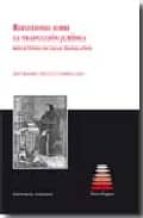REFLEXIONES SOBRE LA TRADUCCION JURIDICA; REFLECTIONS ON LEGAL TR ANSLATION

ISBN: 9788498364835
Eds. Jesús Baigorri, Helen J.L. Campbell. Textos en español e inglés. This volume contains the fruits of a pilot experiment that took place in Salamanca from February 25-29, 2008. The pages that follow are the result of co-operation between the University of Salamanca and IAMLADP, the International Annual Meet-ing on Language Arrangements, Documentation and Publications. It was the brainchild of a group of members of the Universities Contact Group (UCG), part of the Working Group on Training (WGT), a branch of IAMLADP, a UN-based forum for Heads of Language and Conference Services of International Organisations, set up some thirty years ago. In 2001 IAMLADP, previously a forum of UN and UN-system International Organisations ( i.e. employers) only, decided to set up a new Working Group on Training to address the growing problem of finding enough adequately trained language staff recruits. It was time to focus on the training of future language staff recruits in universities: translators, interpreters, précis-writers, editors, proof-readers, terminologists and conference organisers. At the same time, IAMLADP was enlarged to bring in the EU language services, one of whom, the Directorate-General for Interpretation of the European Commission, was asked to take on the task of chairing this Group. Its basic approach was, from the start, one of undertaking joint ventures of a practical nature in different areas, both for life-long training of staff and building closer contacts with those universities from which all IOs hoped to recruit ever dwindling numbers of adequately trained linguists. In 2006, the WGT set up a body known as the Universities Contact Group, a unique forum whose membership was made up of representatives of universities training future language staff and IO staff interested in this area. It was agreed to keep the UCG small and productive, proactive and inventive, and a call for volunteer members resulted in an ideal number of sixteen from each constituen